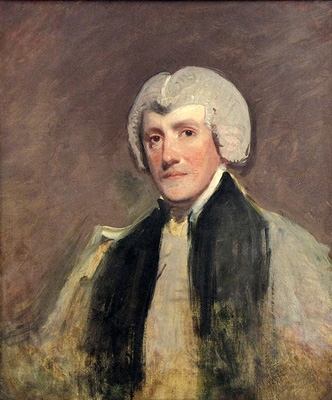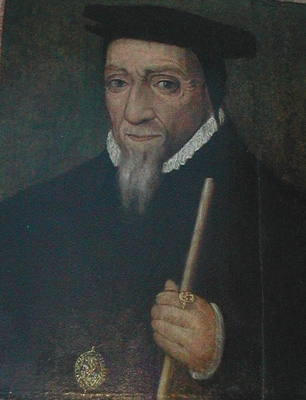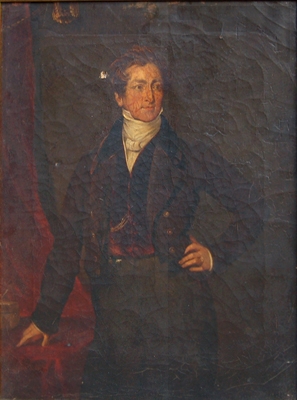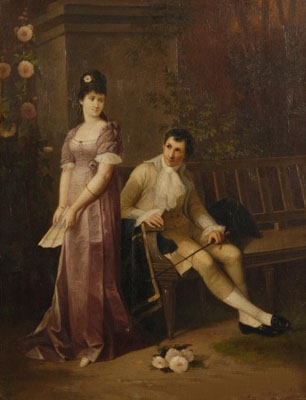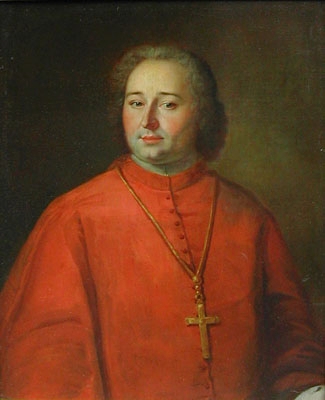The Portrait sketch is for the full length portrait of Manners-Sutton at Windsor Castle, circa 1795. (J Ingamells, English Episcopal Portraits p372 type A1)
Sutton, Charles Manners - (1755?1828), archbishop of Canterbury, was born Charles Manners on 14 February 1755, the fourth son of Lord George Manners (1723?1783) and his wife, Diana (d. 1767), daughter of Thomas Chaplin of Blankney, Lincolnshire; he was grandson of John, third duke of Rutland. In 1762 his father assumed the additional surname Sutton on inheriting the estates of his maternal grandfather, Robert Sutton, second Baron Lexington. Educated at Charterhouse School, he then matriculated as a pensioner at Emmanuel College, Cambridge, on 1 March 1773; he graduated BA as fifteenth wrangler in 1777, his younger brother, Thomas Manners-Sutton, being at the same time fifth wrangler. He proceeded MA in 1780 and DD in 1792. In 1785 he was presented to the rectory of Averham with Kelham, Nottinghamshire, and also to Whitwell, Derbyshire. Manners-Sutton married in 1778 Mary (d. 1832), daughter of Thomas Thoroton of Screveton, Nottinghamshire. They had two sons and ten daughters.
Preferment was rapid. Manners-Sutton became dean of Peterborough in 1791, in 1792 bishop of Norwich, and?because Norwich had a small income and was a large and expensive diocese?influence at court secured him the deaneries of Windsor and Wolverhampton in 1794, to be held in commendam. He and his wife became great favourites with George III and the royal family. In 1794 he was offered the archbishopric of Armagh, but he declined the appointment. At Norwich, Manners-Sutton was a conscientious and well-liked diocesan bishop. He was the first bishop of Norwich consistently to undertake all his ordinations in Norwich. He was hospitable and generous to charities. He dined with his clergy after his visitations and treated them with wine, ?a bottle between two? (Diary of a Country Parson, 3.367). He separated confirmations from visitations. After a confirmation James Woodforde, rector of Weston Longueville, noted that his niece, ?Miss Woodforde [was] much pleased ? with the Bishop''s very agreeable and affable, as well as polite and sensible behaviour? (ibid., 4.141). In his visitations he demonstrated a keen interest in matters of contemporary concern to the church?the employment of curates; the administration of baptism, schools, and almshouses; and disputes over tithe payments?and he asked for any other Matters relating to your Parish of which it may be proper to give me Information, Or any proposal to make whereby the Glory of God and the Good of his Church may be promoted, and this Diocese better ordered, and ourselves mutually aiding and assisting each other in the Discharge of our respective Duties. (Visitation inquiries, 1801, Norwich RO, NDR VIS 39/17)
During the threat of French invasion in 1803 Manners-Sutton urged the clergy to warn the poor of the risks a French occupation might have for them, but he advised the clergy against joining militias or defensive corps. At Norwich, Manners-Sutton seems to have got into financial difficulties, despite the additional revenues of the deanery of Windsor, and he was criticized for extravagance.
On the death of Archbishop Moore in 1805 George III intervened personally with William Pitt to secure Manners-Sutton''s translation to Canterbury, although Pitt wished to appoint his former tutor, Bishop Pretyman-Tomline of Lincoln. As archbishop Manners-Sutton played an active part in the policies of the traditional high-church party then ascendant in the church. He was himself a high-churchman: it was noted that at his primary visitation in Canterbury Cathedral in 1806 that he preached on the significance of confession and its history. Manners-Sutton played a central role in the series of initiatives and reforms to promote the church''s mission in the period of dramatic social change brought about by population growth, urbanization, and industrialization. From at least 1809 he worked to secure government funds to build new churches to meet the needs of the rapidly expanding population. In the House of Lords he took an active part in the attempt to secure satisfactory legislation to provide adequate stipends for curates. With lay members of the Hackney Phalanx, notably Joshua Watson, and with the co-operation of the prime minister, the earl of Liverpool, he worked to secure the Additional Churches Act of 1818, which gave the Church of England ?1 million to build new churches, although he was defeated by ministers in his wish that clergy should be in the majority on the subsequent commission for building new churches. He was one of the most regular attenders at the commission''s committee meetings.
Manners-Sutton was also active with the Hackney Phalanx in reinvigorating existing voluntary bodies to promote the church''s mission and in creating new bodies. The Society for the Promotion of Christian Knowledge was overhauled and Manners-Sutton played a significant part in the foundation of the National Society for Promoting the Education of the Poor in the Principles of the Established Church in 1811; he nearly always chaired the fortnightly meetings of the society''s committee and he persuaded the prince regent to become patron of the society. The society provided a model for the church to act in a corporate capacity in the absence of the convocations, including all of the bishops as its vice-presidents, along with leading laymen. He was closely involved in the foundation of the Incorporated Church Building Society, of which he chaired the majority of meetings, to raise funds to provide grants for building and repairing churches to provide more seats in churches for the increasing population.
Manners-Sutton worked closely with the Hackney Phalanx to revive the Society for the Propagation of the Gospel and he was active in the campaign that secured the establishment of a bishop for India, being closely involved in recruiting Thomas Middleton, archdeacon of Huntingdon, and an associate of the phalanx, as first bishop of Calcutta. Manners-Sutton was also concerned with the extension of higher education. He contributed ?1000 towards the endowment of King''s College, London, and was instrumental in persuading George IV to give his name to the college; he also contributed towards the establishment of both St David''s College, Lampeter, by Bishop Burgess of St David''s and of King''s College in Halifax, Nova Scotia. In 1814 he was appointed to preside over the German Relief Fund to administer a parliamentary grant of ?100,000 for the relief of Germany during the winter of the final Napoleonic campaign, which?because of opposition to the grant in the light of needs for charity relief at home?needed to be a model of accurate accounting. Joshua Watson acted as administrator of the funds. In 1816 Manners-Sutton and Bishop Howley of London unsuccessfully attempted to revive the Association for the Relief of the Manufacturing and Labouring Poor, established in 1812, and in 1817 he briefly flirted with Robert Owen''s plan to put the poor into ?Villages of Co-operation? where, after an initial capital grant from taxes, they would pay their own way while becoming useful, industrious, self-disciplined, and temperate.
Manners-Sutton may have been the initiator of a meritocratic revolution that reinvigorated the Church of England in the early nineteenth century. Although his own preferment was due to aristocratic patronage and royal favour, he, along with Bishop Howley of London, worked with Joshua Watson and his associates in the Hackney Phalanx to test the potential of able young graduates from middle-class backgrounds, making discriminate use of the extensive patronage available to archbishops of Canterbury and promoting the most promising candidates. His own chaplains provided able leaders for the next generation of high-churchmen: Christopher Wordsworth, subsequently master of Trinity College, Cambridge; George Cambridge, subsequently archdeacon of Middlesex; John Lonsdale, subsequently bishop of Lichfield; Charles Lloyd subsequently bishop of Oxford; Richard Mant, subsequently bishop of Down and Connor, and Hugh James Rose, subsequently principal of King''s College, London. Manners-Sutton was however, bitterly attacked by radical pamphleteers for alleged nepotism in his use of patronage. Manners-Sutton was regularly consulted by Lord Liverpool about the appointment of bishops. He was a key figure in the queen''s council appointed to review George III''s health and in the complex relations between the queen and the doctors caring for the king, whom the queen distrusted. He attracted public hostility for supporting the bill for George IV''s divorce on the grounds that divorces ?were expressly declared by our Saviour himself? (Varley, 97). He was also involved in the negotiations over the modifications to the liturgy for George IV''s coronation. At the end of his life Manners-Sutton opposed Roman Catholic emancipation, but favoured the repeal of the Test and Corporation Acts. At Canterbury he was reckoned to be generous in his charity and his hospitality, but he paid meticulous attention to the administration of the archiepiscopal estates, which included major developments at Dover and Deal. In 1808 he purchased Addington Place as a country seat for archbishops in succession to the palace at Croydon, which had been sold in 1780. He published two sermons in 1794 and 1797; An Address to the Clergy of the Diocese of Norwich, in 1803; and he contributed ?A description of five British species of orabanch? to the Transactions of the Linnean Society (vol. 4, 1797, 173). Archbishop Manners-Sutton died on 21 July 1828 at Lambeth Palace and was buried on 29 July at Addington parish church. His eldest son, Charles Manners-Sutton, became speaker of the House of Commons and subsequently first Viscount Canterbury, and his second son was a colonel in the army.
W. M. Jacob
It is hard to imagine anyone more comprehensively a part of the aristocracy than the Right Reverend Charles Manners-Sutton, D.D., who was Archbishop of Canterbury from 1805 - 1828. His pedigree contains numerous Dukes, Earls, Knights of the Garter, and other lords and ladies.The grandson of a Duke, and a nephew of the famous Marquis of Granby, he was himself a member of the House of Lords from 1792. His younger brother, a former Solicitor General, was created Baron Manners in 1807. Subsequently, the Archbishop''s elder son, having served as Speaker of the Commons for 17 consecutive years, was also ennobled with the title of Viscount Canterbury.Charles Manners-Sutton was also, via Lionel - a brother of the Black Prince - directly descended from Edward III, and therefore from William the Conqueror. Other ancestors include Ethelred the Unready and Saint Margaret of Scotland. A Dean at the age of 36 and a Bishop at 37, he was nominated as Archbishop of Canterbury when still only 49. In view of his importance and his many other commitments, it seems surprising that he agreed to come to Bognor - at that time only a hamlet and a tithing of Bersted - to consecrate not a church, but merely a chapel of ease to the parish church. However, come he did.
Antiques.co.uk Ref: MECGB3MQ
- Materials:
- Oil on Canvas
- Width (cm):
- 76.20 x 63.50 cm 30.00 x 25.00 ins





